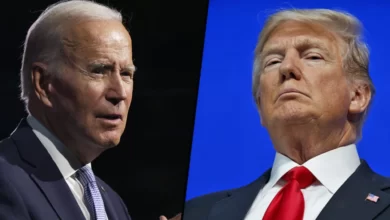
By Gaby Hinsliff – The Guardian:
The PM has a duty to pull any levers he can to ameliorate the president-elect’s global impact. And the war-gaming is well under way
Dawn had barely broken, and nor had Kamala Harris publicly conceded, when Keir Starmer tweeted his congratulations to the not-quite-officially President-elect Donald Trump.
Britain would, he said, stand “shoulder to shoulder” with its old ally, as it always does. Though he got the early opportunity he wanted to congratulate the new president-elect even more fulsomely down the phone, those words will have been gut-wrenching for many people. How can it be business as usual, with a president whose own former chief of staff said he met the definition of a fascist? What on earth makes Starmer think he can influence Trump for the better, the usual rationale for engaging with unsavoury leaders, where Trump’s own advisers repeatedly failed? The only people he ever really heeded, the British-born former White House adviser Fiona Hill once told one of Theresa May’s aides, were the now late Queen and the pope.
Starmer’s obvious answer, of course, is that it would be an act of breathtaking negligence not to even bother trying; that he can’t be squeamish when there are workers afraid of losing their jobs in a trade war, Ukrainians dying under Russian bombardment, and future generations who would pay a terrible price for the US reneging on its climate commitments. The less obvious one, however, is that if he cannot get Trump’s ear then Trump will get his hot takes on the British national interest elsewhere. Starmer may have got that phone call, but it was Nigel Farage who spent election night at the Trump victory party in Mar-a-Lago.
Though this isn’t the result a Labour government wanted, it’s the one it has war-gamed hardest. The charm offensive began months before Starmer and Trump’s relatively cordial dinner in September, with the foreign secretary, David Lammy, making surprisingly deep inroads in Republican circles for a man who once called Trump a woman-hating, neo-Nazi sociopath. But as Lammy’s allies point out, JD Vance once called Trump an idiot who might be the US’s Hitler, which didn’t stop Trump picking Vance as a running mate. The president-elect is both intensely transactional – if anything, he may see British desperation to make up lost ground with him as useful – and wildly unpredictable, a combination offering both opportunity and threat.
The lesson Downing Street takes from studying Trump is essentially the one many Republican voters do: that he says a lot of wild stuff but doesn’t always mean it, and if he does he often unexpectedly changes his mind. Already there are hints he might give Ukraine more time to win its war, if only because he hates being associated with losing, while senior Republicans are signalling that “friendly” nations could escape his threatened trade tariffs – a crude signal that there will be rewards for compliance.
But there will surely also be a price: Starmer could easily find himself pushed to pick a side in trade negotiations between the US and Brussels, just as he is trying to mend fences with Europe. What if a British government that has staked everything on economic growth finds its business interests pulling one way, and its shared interest in the defence of Europe against Russian aggression pulling the other? At the very least, those budget forecasts – and the money set aside for extra defence spending – may well soon need revisiting.
In her memoirs, Theresa May describes the acute anxiety of standing beside then president Trump at a press conference where he was supposed to send a critical signal to Russia by stressing his commitment to Nato, not knowing whether he’d actually say it until he opened his mouth. But at least she could plan for that scenario in advance: harder to deal with was Trump’s tendency to blindside Britain with things nobody saw coming. For her, that meant Trump pulling troops out of Iraq and Syria without warning or concern for British forces fighting alongside them, lobbying her to bring Farage into cabinet, and casually retweeting incendiary social media posts by the British far right. This time, he won’t just be surfing X when he’s bored but actively integrating its owner, Elon Musk – who is already regularly kicking lumps out of Starmer, most recently over cutting inheritance tax relief for farmers – into his administration.
The Southport riots, during which Musk tweeted that “civil war is inevitable” and promoted conspiracy theories about white protesters being more harshly treated than ethnic minority ones, convinced many Labour MPs that hate and disinformation online must be tackled. But how brave are ministers prepared to be if that means a direct hit on someone in Trump’s inner circle?
Labour MPs in seats where Reform came second in July are, meanwhile, now visibly rattled, and newly fearful of handing Farage further sticks to beat them with. Though Starmer learned his own lesson about the salience of immigration or the risks of alienating white working-class voters way back in 2019, Harris’s defeat is only likely to underline that message for him.
There’s no denying that for progressives, the world now looks lonelier than it did; that the choice the US has made will have consequences smaller countries can only do so much to contain. But that doesn’t mean Britain can afford to sit the coming battles out, assuming someone else will do the dirty work. Starmer’s job now is to pull whatever levers he can reach, in alliance with whoever he can persuade to join him; ours, meanwhile, is never to give up hope.





